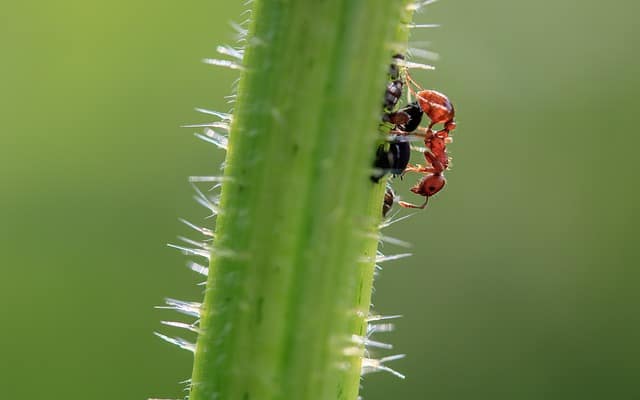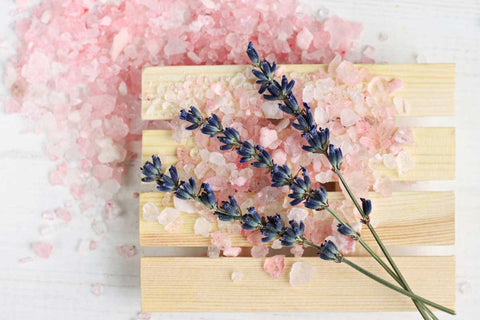Slugs are a persistent pest in gardens. There are many ways to get rid of slugs, but does Epsom salt work? Yes, Epsom salt for slugs can keep them away in the same way that regular table salt can. However, unlike common table salt, which can harm plants, Epsom salt has numerous benefits.
In gardens, Epsom salt can be used as a natural insecticide. Epsom salt penetrates the slugs skin and damages it. The salt dries out the slugs, dehydrating and eventually killing them. Because slugs rely on moisture, dehydration is the most effective method of killing them.
Slugs and snails can quickly destroy ornamental plants and edible crops in the garden. These slimy pests use rasping tongues to chew holes in foliage and feed on roots below ground. While chemical molluscicides are effective Epsom salt provides a natural control option. When used properly, this mineral can repel dehydrate, and kill slugs and snails.
What is Epsom Salt?
Epsom salt, also known as magnesium sulfate, is a mineral compound comprised of magnesium, sulfur, and oxygen. It dissolves readily in water and is commonly used in bath salts Epsom salt also has applications for pest control, plant nutrition, and other household uses.
The name comes from its discovery in the bitter saline springs located in Epsom, England. Epsom salt has been used for centuries as a natural remedy for various ailments. Inside the garden, it can deter slugs in two ways:
-
The abrasive texture of salt crystals deters slugs upon contact, similar to table salt.
-
Magnesium sulfate is hydrating and absorbs moisture which dehydrates and desiccates slugs.
When applied correctly around plants, Epsom salt provides an economical, non-toxic salt barrier that can stop slugs in their tracks.
Will Plain Epsom Salt Kill Slugs?
Yes, plain Epsom salt crystals will kill slugs through contact and dehydration. However, table salt or rock salt is usually more effective and affordable than Epsom salt.
The main advantages of Epsom salt are:
-
Provides supplemental magnesium, an essential plant nutrient needed for photosynthesis.
-
Improves the absorption of nitrogen and phosphorous.
-
Decomposes and enriches soil over time unlike table salt.
Since Epsom salt releases beneficial minerals into the soil, it can be used around ornamental plants and in the vegetable garden. Table salt may damage plants when used heavily over time.
How to Apply Epsom Salt as aSlug Barrier
To create a protective barrier that repels slugs, follow these steps:
1. Water plants well before application
Well hydrated plants are less likely to absorb excess Epsom salt. Watering the day before creates a moisture buffer.
2. Sprinkle a Band around plants
Pour Epsom salt directly from the carton or use a shaker to apply a 3-6 inch wide band around susceptible plants. Focus on the drip line area where slugs travel and congregate.
Reapply every 1-2 weeks or after heavy rain or watering.
3. Mulch over the band
Cover the salt with a thin layer of mulch, compost, or soil to prevent runoff. This allows the Epsom salt to remain effective longer after irrigation.
4. Dispose of dead slugs
Pick up any slug carcasses and dispose of them away from the garden. Leaving them in place risks recontamination of crops.
Epsom Salt Spray for Direct Application
For direct application onto affected plants, create a salt spray by mixing 1-2 tablespoons Epsom salt per gallon of water. Add the salt first and stir until fully dissolved. Pour the solution into a spray bottle or pump sprayer and completely coat the leaves, stems, and surrounding soil surface where slug damage is visible.
Test spray a small area first to ensure the dilution is safe for the plants. Reapply the Epsom salt spray after rainfall washes it away. Combining cayenne pepper or garlic into the spray repels slugs through taste aversion on top of salt’s abrasive effects.
Always spray in the evening or early morning to avoid leaf burn. Never apply to plants that are heat or drought stressed.
Watering Can Method for Large Areas
For large gardens, flower beds, or row crops suffering extensive slug damage, Epsom salt can be diluted in water and generously applied using a watering can.
Fill a 2-5 gallon bucket halfway with hot water. Add 1/2 -1 cup Epsom salt and stir until fully dissolved. Top off the bucket with cool water and stir again. Use this salt solution to liberally drench affected areas. Reapply weekly or after heavy rain.
The Epsom salt gets taken up by the soil and leaves a protective zone around plant roots while also providing nutrients.
When to Apply Epsom Salt
-
Spring – Early in the season when young seedlings and transplants are most vulnerable.
-
Summer – During hot, humid weather when slug populations surge.
-
Fall – To protect autumn crops like lettuce, kale, carrots, and cool season greens.
-
After rain – Reapply salt after heavy rain or watering washes away the barrier.
-
Evening – Best applied at sundown when slugs are active. Avoid watering at night.
-
1-2 week intervals – Reapply salt every 7-14 days for best results.
Where to Apply Epsom Salt
-
Flower beds – All around the outer edges to block slug entry.
-
Vegetable garden – Focus around seedlings, low-growing crops, and along garden perimeter.
-
Potted plants – Sprinkle in a ring around the container rim where slugs crawl up.
-
Hostas, lettuces, greens – Slug favorite crops need thorough protection.
-
Damp areas – Target naturally moist parts of the landscape.
-
Under boards – Slugs hide under debris; lift and sprinkle salt underneath.
Epsom Salt Rate for Slug Control
-
Light infestation – Apply 0.5 lbs Epsom salt per 100 square feet.
-
Moderate infestation – Use 1 lb Epsom salt per 100 square feet.
-
Heavy infestation – Up to 2 lbs per 100 square feet may be needed.
-
Ring around plants – Apply a band 2-4 inches wide around each plant.
-
Container plants – 1/2 teaspoon per 4-6 inches of pot circumference.
Risks and Precautions When Using Epsom Salt
-
Avoid excessive use on plants. Too much Epsom salt can build up in soil and cause nutrient imbalances over time.
-
Keep salts away from young seedlings and salt-sensitive plants like beans, onions, and cabbage which may be damaged by over-application.
-
Prevent runoff into bodies of water where excess magnesium can trigger algae blooms and imbalance ecosystems.
-
Do not inhale Epsom salt dust. Wear a mask and dampen the area when applying.
-
Wash hands after handling Epsom salt to prevent accidental eye irritation or ingestion.
Alternatives to Epsom Salt for Slug Control
-
Diatomaceous earth (DE) – Natural abrasive dust that dehydrates slugs. Must be reapplied frequently.
-
Crushed eggshells – Coarse, sharp texture repels slugs. Scatter around plants.
-
Coffee grounds – Caffeine and aroma deter slugs. Spread around garden beds.
-
Gravel, sand, cinders – Gritty substrates discourage slug travel and damage foliage when they crawl over them.
-
Beer traps – Yeasty brew attracts then drowns slugs. Set containers level with soil.
-
Slug predator insects – Beetles, fireflies, ground beetles eat slugs. Attract them naturally.
When applied properly, Epsom salt provides an affordable, non-toxic, and eco-friendly slug control option that doubles as a fertilizer. Along with cultural methods like removing debris, mulching, and encouraging predators, this mineral can help protect plants from slug devastation using natural means. Give Epsom salt a try to take back your garden from these bothersome pests!
Buy 1 Get 1 Free
Mother Day Sale Live: Use Code “MOMLOVE” For FLAT 10% OFF on All Order! Valid Till 17th May
Get Flat 11% OFF On Order Above ₹1499 | Use Code – FIRSTORDER
Free Shipping Over ₹999 in India | We Ship Globally
- Home
- DIY Recipes
- Epsom Salt For Slugs – Benefits &…
Slugs are a persistent pest in gardens. There are many ways to get rid of slugs, but does Epsom salt work? Yes, Epsom salt for slugs can keep them away in the same way that regular table salt can. However, unlike common table salt, which can harm plants, Epsom salt has numerous benefits.
In gardens, Epsom salt can be used as a natural insecticide. Epsom salt penetrates the slugs skin and damages it. The salt dries out the slugs, dehydrating and eventually killing them. Because slugs rely on moisture, dehydration is the most effective method of killing them.
Benefits Of Epsom Salt For Slugs Control
Pests are every gardeners worst nightmare. Many people are hesitant to use toxic pesticides and other chemical deterrents. Epsom salt is made from natural ingredients, and the magnesium and sulfate in it have been shown to keep garden pests away. Deter pests and eliminate slugs and snails by applying an Epsom salt mixture to your plants.
Magnesium, on the other hand, is essential for seed germination. It promotes seedling growth by strengthening cell walls. Sulfur (sulfate) is another crucial nutrient in soil for seed growth. When you use Epsom salt on your plants, it kills pests and makes them grow faster, stronger, and produce more tasty fruits and vegetables.
Epsom Salt for Pest Control – Is this Effective?
FAQ
How do you use Epsom salt for slugs?
What kills slugs fast?
What pests does Epsom salt deter?
Does Epsom salt kill snails and slugs?
It works to make snails and slugs disappear. This salt is known to be good for the soil, but in a way, it can also be harmful to the soil as well. Make sure you’re paying attention to this before applying the Epsom salts. This is due to the fact that Epsom salt contains a lot of sulfur and magnesium.
What are the benefits of using Epsom salt?
The inorganic name of Epsom salt is magnesium sulphate. Its a combination of magnesium, Sulphur and oxygen. It is crystalloid and appears white just like the normal salt. It is safe to use externally as a bath salt or in dressing for wounds as it is readily absorbed into the skin. In olden days it was used in treating constipation, muscle fatigue and insomnia. Oral intake should be under medical supervision. Consumption of more than a pinch results in diarrhea, abdominal bloating, nausea, headache, light headedness and flushed skin. Daily soaking of the feet in warm water with added Epsom salt would reduce magnesium deficiency.
Does Epsom salt kill Bugs?
Epsom Salt for Vegetable Bugs – Some popular gardening websites claim that you can safely sprinkle a thin line of dry Epsom salt directly in, or alongside, the row when you plant vegetable seeds. Reapply every couple of weeks to keep pests away from your tender seedlings. As an added bonus, plants may benefit from the boost of magnesium and sulfur.
Does salt kill snails & slugs?
This will ensure that when snails and slugs arrive, they are stopped before even entering your garden, acting as a barrier. If snails or slugs cross the line, the dehydrating and abrasive properties of the salt will kill them before they harm your plants.
- The Ultimate Guide to Growing Strawberries in Raised Beds - August 8, 2025
- No-Dig Garden Beds: The Easiest Way to Grow a Beautiful Garden - August 6, 2025
- How to Protect and Preserve Wood for Raised Garden Beds - August 6, 2025



